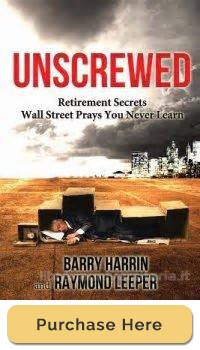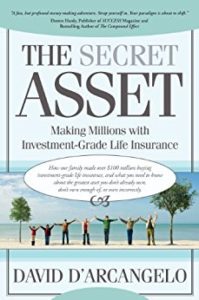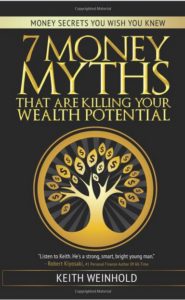
The book is full of examples and tips for those looking to retire with enough money to, not simply eek by, but live on — something that is on the mind of many Americans today. You’ll find tips on saving for college, financing real estate, transferring wealth to heirs, long-term care, and more.
NOTE: Harrin and Leeper have a harsh tone to their writing that may rub some people the wrong way. They paint a picture of alternative forms of saving (401k, IRA, CDs) as though you are dealing with the mob and gambling your life away. There is some truth too what they say, but they are aggressive in their tone and they leave little room for alternative opinions.
According to Harrin and Leeper, the authors of Unscrewed, “retirement success has many definitions, but for us, the cornerstone of retirement success must be … that you never out- live your money!” This is exactly what you want to hear from your financial advisor. So what do you do? “You must take control of your own future!”
Retirement Education
Unscrewed sets the stage by telling us why we need to be concerned about our retirement.
“Politicians of both parties spend our children’s and grand children’s money like drunken sailors or crack addicts. They use our hard-earned tax money to bail out too-big-to-fail banks, credit card companies, and corporations with corporate welfare … that you pay for.”
And…
“A number of factors have gotten us to where we are today. First, we have unscrupulous politicians pandering to human greed and class warfare as they steal money from your Social Security and Medicare.”
The authors suggest that there are a few things that most financial advisers will not mention, but are still concerns for people headed toward retirement.
#1: Not All Health Care Costs Are Covered by Medicare
>#2: Your Adult Children May Need Your Support
#3: Your Parents May Need Your Support
#4: You May Have to Hire People
This final point about hiring people is referring to help around the house — gardeners, pool guy, basic maintenance, house cleaning, etc. Things that you once did on your own that you may no longer be able to do physically as you age.
Unscrewed concludes their opening with a sobering statistic regarding the household income of the past decade or so.
“From 1999 through 2007 the real median household income fell 1 percent. It fell another 4 percent during the 2008-2009 recession. And then, incredibly, the real median income fell again during the recovery dropping an estimated 5 percent in 2010-2013.”
To make matters worse, the authors point out that if you go back to 1992, the median household income has increased by only about 4 percent (over a 19 year period – through 2011), but “the cost of gas per gallon has gone up 350 percent.” In other words, transportation costs are a much larger part of your expenses.
Common Retirement Mistakes
Mistake #1
The first and single biggest mistake people make is not taking the time to educate themselves regarding their own finances.
For those of you reading this article, you’re obviously not making this mistake. But keep in mind that a few articles online does not make someone an expert. It takes time and effort to stay informed.
Mistake #2
Not paying yourself first.
This mistake is one of the reasons why agents will suggest whole life insurance vs term life, because people are rarely disciplined enough to “invest the rest.” In fact there’s a statistic mentioned later in the book about this very thing.
Mistake #3
The failure to understand how much taxation, interest and inflation will affect your future financial plans.
Taxes and inflation are probably the number one reason why LIRPs are so popular these days. Even though the stock market is making record breaking new highs, we don’t know where taxes will be in the future.
Mistake #4
Commingling your savings and investments.
Unscrewed makes the case for having a LIRP even if you have an employer matched 401k, or an IRA. Thus far, all the common mistakes in the book seem to fit the paradigm that suits the IUL agent, but there is some validity to what is being said.
Mistake #5
Not seeking professional assistance.
The internet, self-publishing, and sites like E-Trade have made DIY retirement planning much more common in our day and age. But just like any other endeavor, the people that do it all day long, every day of the week, tend to know much more than you do.
Mistake #6
Not taking advantage of the POWER of compound interest, tax deferral and tax free distributions.
A good reminder that starting early and allowing compound interest growth to fuel your retirement is the most powerful weapon in your arsenal.
Mistake #7
Using inflexible plans such as IRA’s and 401(k)’s as your primary savings and retirement plan.
One more opportunity here for the authors to build on the foundation that the 401(k) is not the golden goose we once thought it was. They do allow for employer matched contributions to be part of the retirement picture, but otherwise they think it’s a risky avenue that has proven to be ineffective over the long haul.
The Real Cost of Taxes
In Unscrewed the authors showcase that a typical employee now pays about 7.85 percent for Medicare and Social Security taxes and that is in addition to federal, state, and local taxes. Now it’s true that those taxes are paying for something you’re highly likely to need in the future, so it’s money well spent. But the point is that it’s still a tax and it’s money you aren’t keeping. So what else is taxed?
The authors want to address the double taxation that happens with many goods and services. The gasoline tax is a perfect example. Here’s what they have to say about it:
“If you receive $100 of income and pay 30 percent in federal income tax, you are left with $70. Now you take your $70 and fill up your car with gasoline. Unfortunately, of the $70 needed to fill up your tank, 50 percent (or $35) is for fuel taxes… How much tax did you actually pay on your $100 of income in this scenario? The answer is 65 percent. Of the $100 you earned, $30 went to federal income tax, $35 went to fuel tax, and the remaining $35 went to the cost of gasoline.”
The point the authors are making is that taxes are a huge part of your financial picture. If you aren’t keeping taxes at the forefront of your planning, then you will likely be in for a huge surprise — and it’s not the kind you’re going to like.
The Future Looks Challenging – Time to Get Help
Unscrewed recommends getting an agent that is in the “top 10%.” What they are suggesting is that the amount of qualified agents in the market today is dwindling, and therefore you need to be more particular in securing the right agent. Their recommendation is that you find an agent that does a lot of “fact finding” – asking personal questions. The fact finding will help the agent produce the type of plan that best suits your needs instead of putting you into a one size fits all product.
What About Life Insurance?
About half-way through the book we find that the authors are really pushing permanent life insurance as the best retirement vehicle. They give some good background for those that don’t know much about life insurance in America, and they provide a healthy overview of the benefits to the policy owner.
“The defining moment that turned the ultra conservative life insurance industry on its head came in 1977 when Arthur L. “Art” Williams Jr. founded the A.L. Williams Company later known as Primerica Financial Services. Up until this point the major product in the life insurance industry had been expensive, cash-value whole life or permanent insurance. However, Williams’ marketing brilliance and unforgettable slogan of “Buy term and invest the difference” forever changed the industry. William’s convinced many customers to switch from their conventional whole life insurance policies to the much less expensive term life insurance.”
Unscrewed goes on to show that temporary life insurance is a big money maker for the insurance companies because historically only 2% of policies ever pay the death benefit. In other words, the vast majority of policies expire without any benefit paid.
The authors take on the big media guru’s in the financial industry as well. They don’t have much good to say about “Mad Money” Jim Cramer, aside from his entertainment value. They cite his rather abysmal success at a key point in history as follows:
“If you were watching Cramer’s “Mad Money” on March 3, 2008, you heard him strongly defend the financial company Bear Stearns and loudly proclaim the company was fine and you should not pull out your money. Unfortunately, if you followed his advice, less than a week later, Bear Stearns collapsed and you lost all your money.”
The authors don’t have as many harsh words for Dave Ramsey and Suze Orman, mainly because they believe the pair do more help than harm in the area of bad debt. But they do take issue with the “buy term and invest the difference” mantra that seems to come from both.
Dave and Suze like to point out that the “difference” that is invested in “quality mutual funds” will likely earn “12 percent” annually on average. For those new to the scene, we know this is absurd. And the data doesn’t come close to supporting the claims.
In addition, as I mentioned earlier in the article, there was a study that was done that shows that human investor behavior is far from what the media gurus would like it to be. Here’s the data I was referring to:
“The study was called Quantitative Analysis of Investor Behavior (QAIB). This study showed a very different picture from the one media gurus, the Wall Street hustlers, and their front men have painted for us these many years. The study shows that over a 20-year period ending December 31, 2010, the AVERAGE equity mutual fund investor would have earned an annualized return of only 3.27 percent versus the Standard and Poor (S&P) gain of 9.27 percent. The shortfall of 5.87 percent is called the behavior gap.”
In other words, the S&P may have earned an average of 9.27 percent, but the average investor was more volatile in their trading — choosing to sell when they should sit tight and waiting too long to buy when the opportunity is ripe.
NOTE: Unscrewed doesn’t even mention the fact that negative years KILL average returns. If you have a floor on your returns that is above 0% you can count on your average return numbers. But if you allow for negative returns the average number can be misleading. And it definitely is not an apples to apples comparison with average numbers that don’t allow negative numbers. We explain this in detail here.
The authors are quick to point out that the guru’s failed to properly advise their public regarding the benefits of permanent life insurance by stating,
“The first fact is that term insurance is strictly a death benefit, while permanent whole life can be structured to have a death benefit, a cash benefit, AND living benefits you can access and utilize before you die. The second fact is that a highly skilled and honest agent will be able to structure a unique solution for your needs using a very special type of cash value whole life insurance policy. This properly structured policy can last a lifetime while it safely grows your retirement savings.”
Indexed Universal Life is a Retirement Saver
The authors of Unscrewed are really fond of the IUL product. And what they have to say about IUL is right on the money.
“The indexed universal life insurance product (IUL) has become the hottest product in the history of the life insurance industry … and for good reason.”
The big reason the authors love the IUL, is because it is not a qualified plan, but it “enjoys more tax protections under the current IRS Code than any other financial product in the market today.”
The IUL has the following features:
- Tax Free Death Benefit
- Tax Deferred Cash Accumulation
- Cash Value Rate Floor Protection (0% or greater)
- Cash Value Rate Cap in the Low teens (~13%)
- Tax Free Cash Access
- Low Fees if Properly Structured
- No Early Withdrawal Fees
- No Required Minimum Distributions
- Long Term Care Protection
- Legal Protection against Bankruptcy and Lawsuits
Concluding Thoughts
The book finishes off with a chapter on savings strategies and also a chapter for those that say they don’t have any extra money. The strategies are interesting to read, but are fairly specific and you may only find one that is close to your situation. They mention how to save for college, how to pay for a home mortgage (or not), how to pass down death benefits when equity is wrapped up in a house, and even how to take advantage of the tax benefits within a multi-level marketing business.
The point they make about money expenditures in the average American home, is that most of us have come to think of luxuries as essential expenses. They concluded that the average family with two or more children was “overspending by anywhere from $500 to $700 per month … wasting money that could be better used for college, emergency and retirement savings.”
Unscrewed: Retirement Secrets Wall Street Prays You Never Learn provides plenty of food for thought as well as good tips and guidelines for navigating the retirement planning landscape. We here at Insurance & Estates enjoy reading books on the subject of retirement planning, and we hope you’ve benefited from our review of this book. As always, there is plenty more in the book for those that really want to get the meat of the discussion.
And for those of you that would like a free evaluation of your own retirement picture, please contact us today. We don’t just read books on this subject, we also happen to be practicing these principles with our valued clients on a daily basis.






2 comments
Lisa Melby
Awesome book! Unscrewed is an excellent book for not only the Consumer, but for Agents. This should be required reading. Thank you for unpacking retirement in a very logical and step by step program. I learned a LOT! Lisa :o)
Insurance&Estates
Thanks Lisa for your interest and insightful comment!
Best,
I&E